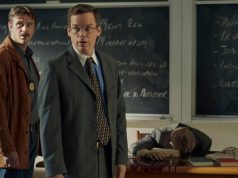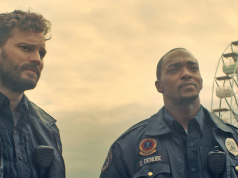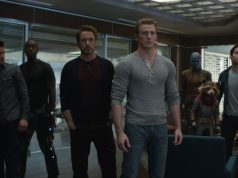They don’t make a lot of movies for grown-ups nowadays, but “The Lake House” is one. Both of its stars are over 40, neither is blond, and not one of the songs on the soundtrack is sung by anyone you’ve seen on MTV recently. (Carole King, anyone?)
Being different doesn’t necessarily make the film good, of course, but “The Lake House,” a remake of a 2000 Korean film (“Siworae”/”Il Mare”) that was never released in the U.S., is a mature and earnest romantic drama that is far superior to the bubblegum we usually get, the stuff that stars Mandy Moore or some equivalent person.
The premise may remind you of “Frequency,” the 2000 Dennis Quaid/Jim Caviezel film about a father and son who communicate 30 years apart through an old wireless radio. In the present story, a lonely doctor named Kate (Sandra Bullock) and a sullen architect named Alex (Keanu Reeves) correspond through notes left for each other in a mailbox at a Chicago-area lake house that they each once lived in. He puts a note in the box, she takes it out, back and forth like that. The problem? They live exactly two years apart. When it’s April 3, 2006, for Kate, it’s April 3, 2004, for Alex.
So you think: Why doesn’t Alex just go find Kate in his time, 2004? And in fact he does happen to meet her at a party. But what’s he going to tell her? “Two years from now, you’re going to exchange letters with me through a magic mailbox at a house you don’t live in yet”? As pick-up lines go, that one’s not very good.
Instead they take the opposite tack. Kate tells Alex to meet her on a particular date — tomorrow for her, tomorrow plus two years for him — at a particular restaurant. But there are complications with that plan, and the pen-pal romance that has developed between them is threatened by more than just the metaphysical distance that separates them.
I like that the film, with a screenplay by David Auburn (who wrote the brilliant play and OK movie “Proof”) and directed by Argentine filmmaker Alejandro Agresti, asks the same questions you and I would ask if we were in this situation, and comes up with the same potential solutions that would probably occur to us. This is noteworthy because “The Lake House” isn’t even close to being a sci-fi film, yet it pays more attention to the details than many sci-fi films do.
It’s a romance, with many of the conventions of the genre. For example, Kate and Alex each have significant others whom they clearly don’t belong with, and Kate uses some especially florid language when Alex asks her what she loves. (“Smelling the flowers before I see them; when it starts to rain just as the picnic is ending,” she says, as I vomit.) And the movie employs the most basic plot structure: We have two people who should be together, and most of the film is spent keeping them apart. The time paradox is simply the obstacle of choice.
There is not much use for Christopher Plummer as Alex’s estranged brilliant architect father, nor for the wonderful Shohreh Aghdashloo as Kate’s doctor friend, except that they provide some context for the moody main characters and their various time-based neuroses. Kate is stuck in the past with an old on-again/off-again boyfriend (Dylan Walsh) while hoping something better will come along in the future; Alex has spent years trying to forget his past, yet can’t seem to make solid plans for the years to come, either.
Bullock and Reeves carry the film well, considering they share only a little screen time together. As my sister put it — yeah, I saw the movie with my sister; what about it? — “Keanu is a much better actor when he’s just playing himself.” I think that sums it up. He’s genuinely emotional a couple times in this film, and I actually believed him. And if I can believe Keanu Reeves as a real person with real feelings, I can believe anything, even magic mailboxes.
Note: A couple brief scenes take place in the lake house’s attic. Yet in the many, many, many, many exterior shots of the all-glass house, it is very obviously a one-story box with no attic whatsoever. That part actually confuses me more than the time paradoxes do.
B (1 hr., 45 min.; )





